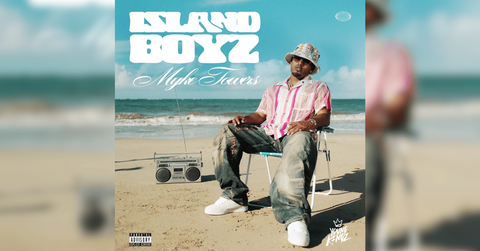Myke Towers Goes Full Caribbean with Genre-Blending 'Island Boyz'

July 28 2025, Published 1:30 a.m. ET
Myke Towers isn't interested in playing it safe. The Puerto Rican artist's latest album, "Island Boyz," abandons the typical reggaeton playbook in favor of a 23-track journey that pulls from ska, Afrobeats, and Mexican tuba sounds. Released July 17, the project feels less like a standard urban album and more like a sonic passport through the Caribbean diaspora.
"I wanted it to sound like where I'm from, but also like what I'm living right now," Myke Towers explained about the creative process. "Island Boyz is the realest thing I've done to date."
The album's title isn't just branding—it's a mission statement. Towers positions himself not merely as a Puerto Rican artist but as a Caribbean creator with global ambitions, unafraid to experiment with sounds that might confuse traditional reggaeton purists.
The Unexpected Collaborations That Define the Album
Where most reggaeton albums stick to familiar Latin urban features, "Island Boyz" reads like a United Nations roster. Nigerian artist Omah Lay appears on "No Hay Break," while Brazilian singer Ludmilla contributes to "Freaky." Mexican regional star Gabito Ballesteros shows up on "No Quiere Flores," proving that Towers' vision extends far beyond typical genre boundaries.
The Spanish connection proves particularly fruitful. "Soleao," featuring Quevedo, has become a hit on Spanish radio and emerged as a legitimate summer anthem across both the U.S. and Puerto Rico. The track's success demonstrates how strategic international partnerships can expand an artist's reach without diluting their core identity.
Even the album's more traditional reggaeton moments feel refreshed. "Surferita" with iZaak merges ska rhythms with Mexican tuba, creating something that sounds both nostalgic and futuristic. These aren't random genre experiments—they're calculated moves that expand reggaeton's sonic vocabulary.
Myke Towers' Bid for Artistic Permanence
At a time when reggaeton often prioritizes viral moments over album craft, Towers has constructed something built to last. The album opens with "La Despedida," a collaboration with DFZM that immediately establishes emotional weight. Rather than front-loading hits, Towers uses the opening track to set a contemplative tone that carries throughout the project.
"Tengo Celos" serves as the album's focus single, complete with a music video directed by Daniel Eguren, with creative direction by Pol Gago Guilera and César Laboy from Vampire Studio. The track represents Towers' ability to balance commercial appeal with artistic integrity—catchy enough for radio but sophisticated enough to reward repeated listening.
The album's structure reveals an artist thinking beyond streaming numbers. At 23 tracks, "Island Boyz" demands attention in an era of playlist culture. Towers isn't chasing quick dopamine hits; he's crafting an experience that requires investment from listeners.
Beyond the Music Industry Machine
Towers' recent appearance at the MLB All-Star Celebrity Softball Game in Atlanta—his second consecutive year participating—reflects his growing cultural influence beyond music. Joining fellow Latin artists Young Miko, Eladio Carrión, and Wisin at the event benefiting Boys & Girls Clubs of America, he's positioning himself as a cultural ambassador rather than just another reggaeton star.
The timing feels intentional. As reggaeton continues its global expansion, artists like Towers are defining what the genre's next phase might look like. His 2023 hit “LaLa” topped the Billboard Global Excl. U.S. chart and peaked at #3 on the Global 200, proving his ability to connect with international audiences while maintaining his Caribbean identity.

"Island Boyz" represents more than just another album release—it's a statement about reggaeton's creative possibilities. Towers has crafted a project that honors his Puerto Rican roots while embracing the genre's global future, proving that artistic ambition and commercial success don't have to be mutually exclusive.


